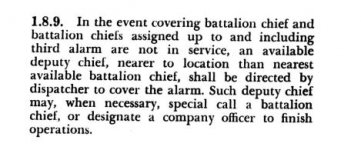What calls does a BC respond to? They’re obviously not responding to every little run in their area, are they?
and same with DCs. I see them on bigger incidents mainly because they cover such a large area. A division chief wouldn’t be responding to a fire alarm, correct?
and same with DCs. I see them on bigger incidents mainly because they cover such a large area. A division chief wouldn’t be responding to a fire alarm, correct?

